Annual Conference 2024: highlights
Britain’s top EDI leaders, representing government and every industry sector, were among over 700 people meeting us in person or online for last Tuesday’s (2 July) Annual Conference on the theme ‘We can work it out – reasonable adjustments in a modern world’, which focussed on making the world more inclusive for everyone.
Our host, BT Group’s Director of Contract Management Eleanor Hudson, set the conference tone by sharing her personal story of how attitudes have changed dramatically at BT in the 20 years since she kept her disability, the missing sight in one eye, hidden from her employer.

Next up was the ongoing complicated debate about home versus hybrid working:
Where are we? Where and how we work in today’s world saw Business Disability Forum’s Bela Gor and Emily Jackson join Asset Manager, Vasiliki Arvantii from Derwent plc (who manages 70 buildings). The panel debated a working world where there is no right and wrong, but where everyone is different, with different needs.
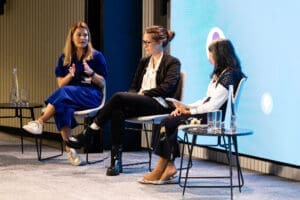
In a complex area, the return to office mandate sees firms pushing for office return for collaboration benefits and ‘learning by osmosis.’ But disabled colleagues can find office work less productive due to barriers like noise or commuting.
Bela shared that she prefers working from home, with its improved mental health benefits, time to eat a better diet, and avoiding long commutes. Emily enjoys working in the office 4 days a week because she loves the separation of work from home life and structuring work tasks. She also highlighted the physical and mental health benefits of the daily commute – 7000 steps versus just 7 to the sofa and back, when working from home. Vasiliki prefers the office for her mental health and did not enjoy being home during COVID.
In a delegate poll 61 per cent said they prefer hybrid working with the majority of time at home, just 20% said home working with most of the time in the office and only 3 per cent from the office full time.
BDF’s Director of Policy, Angela Matthews, fronted a hard hitting speech, Who are we? Data monitoring and disability workplace reporting, where she emphasised the significance of seeing the humanity behind the targets and initiatives.
“As an inclusion profession we are so focused on targets that we’ve forgotten humans,” she told delegates.
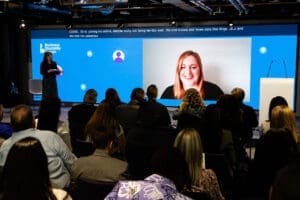
Angela outlined some of the learnings from the working group with BDF membership she leads to inform a response to the government’s consultation on mandatory disability workplace. She highlighted that often organisations’ decisions to monitor the percentage of disabled employees in workplaces and the disability pay gap was coming from boards, who wanted data but were failing to ask about the experiences of disabled employees. Matthews said this data monitoring was encouraging a “power struggle” between disabled workers and their employers.
“We are hellbent on measuring diversity, but are we achieving inclusion?”
Matthews told delegates that for disabled people “just being there” in the workplace is not enough, adding: “If they have a rubbish time, we’re not doing inclusion.”
There was concern that employers had received requests from disabled employees to reduce their seniority to better manage their conditions but were denied requests “because of the fear their disability pay gap would widen.”
Matthews advised businesses to focus on “measures of not just inclusion but success”, adding: “Are [disabled employees] happy; do they have everything they need and in a timely way?”
Our CEO Diane Lightfoot walked us through BDF’s Manifesto for a disability inclusive UK, outlining the 5 key strategies that we are asking of the new Government and business. Diane stressed that making the UK and its society better for disabled people is not the job of Government alone. “It is only by working together, across Government, business and, crucially, with disabled people that we will truly ‘move the dial’ and make the transformative changes that are needed so that every citizen can access the same opportunities and life chances.”
After lunch in Disability inclusion stories we heard from 3 of the winners in this year’s Disability Smart Awards. Charlie Magadah-Williams from Primark (winner of the Inclusive Product Design Award) highlighted their inclusive and accessible range of lingerie, demonstrating their commitment to meeting the needs of all customers and telling us about how they worked with disabled models to create the products and the associated campaign.
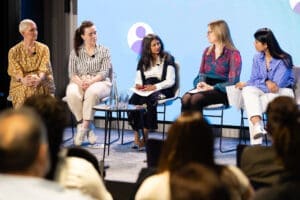
Kim Whippy, PwC UK, (winner of the Disability and Inclusion Professional Award) then shared their inspiring neurodiversity project, “Great Minds Don’t Think Alike,” which is breaking down barriers and celebrating the unique strengths of neurodivergent individuals.
And lastly Caroline Curtis Powell and Nainika Vyas from the Vanish brand team at Reckitt (winners of the Inclusive Communication Campaign Award) told us about their collaboration with Ambitious About Autism to create ‘Me, My Autism and I’ and how autism had played into their brand values in interesting ways.
Reckitt’s presentation kicked off with an emotional video featuring a young woman with autism and her family. In this very relatable piece, we saw the importance of a favourite piece of clothing (a hoodie in this case) in the central character’s life. We all have favourite garments, we want to wear again and again and we want to take care of it, but Reckitt’s research found for some autistic people this need is extra important. “We realised that this truth is so much more valid to the autistic community. When we understood that relation to consistent clothing, we realised that it is a community that is very directly impacted by our brand fight, which is to make clothes live longer.”
Following the afternoon break, Bela Gor, our Director of Legal and Content, posed some interesting workplace scenarios in Clash of the adjustments, for a panel of guests with wide CVs and experience – Andy Garrett, Global Programme Director and Workplace Adjustments Service at GSK, Safia Kuaswadia, International Diversity, Equity & Inclusion Specialist DLA Piper and Charles Clement of BT Group. How do you make adjustments work for everyone in a shared office space, when one person needs it cold and bright and another dimly lit and warm, for example? How do you balance this with a boss that wants everyone in the office?
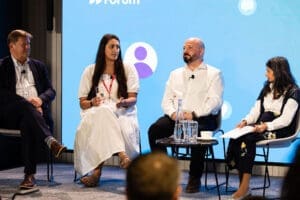
Charles, Andy and Safia provided valuable insights into how organisations can navigate these challenges to create harmonious and inclusive environments for all employees, with a range of suggested solutions around targeted heating / lighting and flexible working from home. All agreed that adjustment clashes are not always easy to resolve, and need to be worked through, in collaboration with the team and the situation’s stakeholders. And always with the understanding that “one size does not fit all”.
The last session of the day saw Birgit Neu talking to our CEO Diane Lightfoot about where DEI is going, in an inspired, informed and forward-looking session called: What the world needs now.
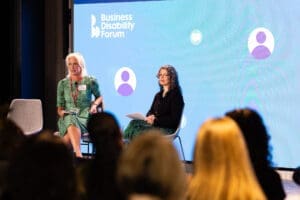
Birgit has Global knowledge of Senior DEI ‘frontline strategy’ and implementation developed from being Global Head of D&I at HSBC.
In this session she brought a straightforward “bird’s eye view” of DEI, the conference theme, DEI in the modern world and what might be round the corner for DEI.
Birgit talked about the personal developing world for everyone in the room, whose organisations will all view DEI differently. She said there is a DEI lens on everything that is going on right now. So, while she talked about the huge progress made, she also referred to the current confusion about ‘what this DEI thing actually is’ and what we think we should be doing.
Birgit also broached the highly topical subject of AI. She quoted the CEOs of Google and JP Morgan, who talk about AI as the next Industrial Revolution. She also highlighted that while the current discussion is around AI causing a bias in recruitment, things are moving fast and changing both for the right and wrong in many other areas. A challenge for DEI professionals to think about.
Birgit’s key ask to delegates was that if you are not a tech person, stop ignoring AI – start to pay attention, and to learn a little bit more about how AI is going to apply to your specific day jobs.
“For those of you who might have been blissfully trying to ignore a lot of the AI news going on, just today’s tech hype, something else will come up, we need to be really, really clear that this is something very, very different this time around.”
Diane Lightfoot pulled together the day’s themes in a wrap of the day.
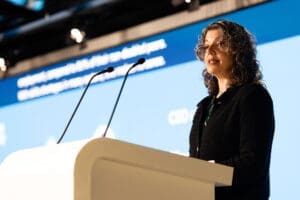
She reminded us of the importance of role modelling, the importance of adjustments, however complicated. And how it often takes creative and open conversations which ignore off the peg solutions – to find the answer.
She reminded us about data monitoring and its risks of becoming focussed on targets and forgetting the humans.
She celebrated again the fabulous disability inclusion stories and the talent and opportunity they showcased. And she wondered about those clashes of adjustments, which happen every week up and down the country and around the world and need thoughtful solutions every time.
Watch session recordings from Annual Conference 2024
For more disability inclusion stories, read our Disability Smart Award stories.